
Chris Plummer
Films like Alain Resnais classic Hiroshima Mon Amour helped win over Chris Plummer to the possibilities of telling stories on film. He was playing in punk bands at the time, and Godard movies like Vivre sa vie felt like the filmic equivalent, showing it was “possible to be radical and expressive” with film as well.
Plummer studied communications at Sydney’s University of Technology, and spent time at Auckland filmmakers co-operative Alternative Cinema. While at the latter, he jury-rigged a 16mm film processor with old equipment from the Ministry of Works, using an electric jug element to keep the chemicals at the right temperature.
Having concluded there were enough directors in the game already, Plummer decided to dedicate himself to editing. In 1986, a year after writing to TVNZ seeking work, he was offered the chance to work for the organisation as an editor.
Soon after, Plummer got to work with director Bill Saunders. Plummer found Saunders “a revolutionary documentary filmmaker” whose cinema verite work chronicled people rarely heard on Kiwi television. Plummer went on to edit Saunders’ final documentary, 1994’s Everybody Hurts. “He taught me a lot, bless him.”
In this period, Plummer was being invited to edit noteworthy, offbeat short films with directors Christine Parker (Hinekaro Goes on a Picnic and Blows up another Obelisk), Brad McGann (award-winner Possum) and Niki Caro (the near-dialogueless Sure to Rise).
After editing episodes of Cover Story and hour-long TV drama The Call Up, Plummer was invited to edit Parker’s decade-spanning Channelling Baby. It was the first feature for both of them. Madcap ensemble movie I’ll Make You Happy followed soon after.
Over the next few years — aside from editing 2001’s Crooked Earth and an assistant editing gig on Oscar-nominated Michael Caine film Quiet American — Plummer worked mainly on international television productions that were shot in New Zealand. These included Riverworld, and the final episode of Renaissance adventure show Jack of all Trades.
Plummer’s next movie project would win him a New Zealand Screen Award. He was attracted to Maurice Gee adaptation In My Father’s Den by the script, director Brad McGann, plus “the fact Patti Smith music was integral to the story”. The edit involved moving between four different time frames, but Plummer is proudest of his work on delicate scenes between the film’s two central characters, as they get to know one another.
Plummer followed Father’s Den with short film Easter Sunday, starring American actor Jennifer Jason Leigh. His next two features were very different, and both resulted in further editing nominations: Jonathan King's ovine horror comedy Black Sheep, and Toa Fraser’s all in-one-day family drama No. 2, which Plummer began assembling in the first week of shooting.
He would reunite with King again on Maurice Gee adaptation Under the Mountain, and with Fraser on Dean Spanley. Set in England, this tale of a complicated father, a curious son, and an unusual priest would win Plummer a New Zealand Film and Television editing award. In 2017 he was credited as one of the writers and editors of Fraser's extreme sports documentary The Free Man.
Plummer also edited Vincent Ward’s acclaimed documentary Rain of the Children. He went on to Taika Waititi’s second feature Boy. The film scored him another editing award in the 2010 Qantas Awards, the same year it became the most successful Kiwi film released on home soil to that date.
Sources include
Chris Plummer